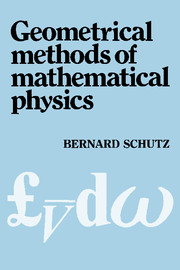Book contents
4 - Differential forms
Published online by Cambridge University Press: 05 August 2013
Summary
The calculus of differential forms, developed in the early part of this century by E. Cartan, is one of the most useful and fruitful analytic techniques in differential geometry. The catalogue of concepts that are unified and simplified by forms is astonishing: the theory of integration on manifolds, the cross-product, divergence, and curl of three-dimensional Euclidean geometry, determinants of matrices, orientability of manifolds, integrability conditions for systems of partial differential equations, Stokes' theorem, Gauss' theorem, and much more. As with most mathematical and physical ideas which are truly fundamental, the mathematics of forms is very simple. In this chapter, we introduce forms in the geometrical context in which they arise most naturally, and we then systematically develop their power.
The algebra and integral calculus of forms
Definition of volume — the geometrical role of differential forms
Until now we have avoided giving our manifolds any shape or rigidity. We have mentioned the possibility of defining metric tensors, but we have concentrated on those analytic tools which are definable without reference to any particular metric. Now we will turn to the study of a particularly useful class of tensors: those which can serve to define volume elements on manifolds.
Information
- Type
- Chapter
- Information
- Geometrical Methods of Mathematical Physics , pp. 113 - 162Publisher: Cambridge University PressPrint publication year: 1980
